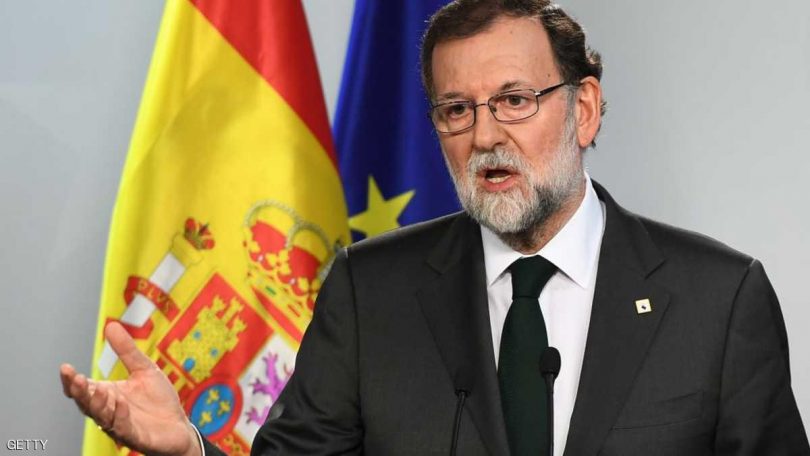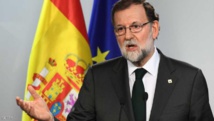Rajoy said on Friday evening that the Catalan parliament would be dissolved and new regional elections would take place on December 21, as the biggest political crisis to face Spain in at least three decades reached its highest pitch so far.
"I have decided to call free, clean and legitimate elections as quickly as possible, to restore democracy," Rajoy said. "We never wanted it to come this far."
Catalonia's parliament voted on Friday afternoon for a resolution in favour of independence, and within the hour the Senate in Madrid authorized Rajoy to take unprecedented measures against secessionism in the region.
Rajoy said the government in Madrid is also asking the Constitutional Court to invalidate the Catalan parliament's resolution.
The upper chamber in Madrid agreed to government demands to activate article 155 of the constitution, allowing the executive to take action against rebellious territories.
"What happened today in the Catalan parliament is unequivocal proof of how necessary it was for the Senate to approve" the triggering of article 155, Rajoy said earlier Friday.
In Barcelona, Puigdemont and his ministers sang the Catalan national anthem after taking part in the secessionist vote. The regional president then addressed hundreds of pro-independence mayors from the top of a staircase.
"In the coming hours we must keep our country alive. We must do it in a peaceful, civilized and dignified way, as we have always done and we will keep doing," Puigdemont said, calling Friday's vote "a long-awaited step" which many Catalans had fought for.
It was passed with 70 votes in favour, 10 against and 2 blank ballots. The unionist opposition parties - the socialist PSC, the Rajoy's People's Party (PP) and the centrist Ciudadanos - walked out of the chamber.
Puigdemont and his allies risk arrest: they have been warned that a declaration of independence could see them charged with "rebellion," a crime carrying a maximum 30-year sentence, and taken into pretrial detention.
Rajoy might struggle to control a region whose leaders are planning a civil disobedience campaign against any order from Madrid. It is also unclear what would happen if a new set of regional elections were to return another secessionist administration.
Rajoy said Catalans needed freeing from "a minority that, in an intolerant fashion, wants to submit everybody to the yoke of its [secessionist] doctrine," acting undemocratically and against the law.
Catalan secessionists want to break free on the basis of a disputed October 1 referendum that gave an overwhelming pro-independence result. But the ballot had a turnout of only 43 per cent and was not properly monitored as it was declared unconstitutional.
Catalonia has 7.5 million people and accounts for almost 20 per cent of the Spanish economy. Its nationalist pride is boosted by a separate language and culture, but its society is deeply split on secession.
"I have decided to call free, clean and legitimate elections as quickly as possible, to restore democracy," Rajoy said. "We never wanted it to come this far."
Catalonia's parliament voted on Friday afternoon for a resolution in favour of independence, and within the hour the Senate in Madrid authorized Rajoy to take unprecedented measures against secessionism in the region.
Rajoy said the government in Madrid is also asking the Constitutional Court to invalidate the Catalan parliament's resolution.
The upper chamber in Madrid agreed to government demands to activate article 155 of the constitution, allowing the executive to take action against rebellious territories.
"What happened today in the Catalan parliament is unequivocal proof of how necessary it was for the Senate to approve" the triggering of article 155, Rajoy said earlier Friday.
In Barcelona, Puigdemont and his ministers sang the Catalan national anthem after taking part in the secessionist vote. The regional president then addressed hundreds of pro-independence mayors from the top of a staircase.
"In the coming hours we must keep our country alive. We must do it in a peaceful, civilized and dignified way, as we have always done and we will keep doing," Puigdemont said, calling Friday's vote "a long-awaited step" which many Catalans had fought for.
It was passed with 70 votes in favour, 10 against and 2 blank ballots. The unionist opposition parties - the socialist PSC, the Rajoy's People's Party (PP) and the centrist Ciudadanos - walked out of the chamber.
Puigdemont and his allies risk arrest: they have been warned that a declaration of independence could see them charged with "rebellion," a crime carrying a maximum 30-year sentence, and taken into pretrial detention.
Rajoy might struggle to control a region whose leaders are planning a civil disobedience campaign against any order from Madrid. It is also unclear what would happen if a new set of regional elections were to return another secessionist administration.
Rajoy said Catalans needed freeing from "a minority that, in an intolerant fashion, wants to submit everybody to the yoke of its [secessionist] doctrine," acting undemocratically and against the law.
Catalan secessionists want to break free on the basis of a disputed October 1 referendum that gave an overwhelming pro-independence result. But the ballot had a turnout of only 43 per cent and was not properly monitored as it was declared unconstitutional.
Catalonia has 7.5 million people and accounts for almost 20 per cent of the Spanish economy. Its nationalist pride is boosted by a separate language and culture, but its society is deeply split on secession.









 Home
Home Politics
Politics











